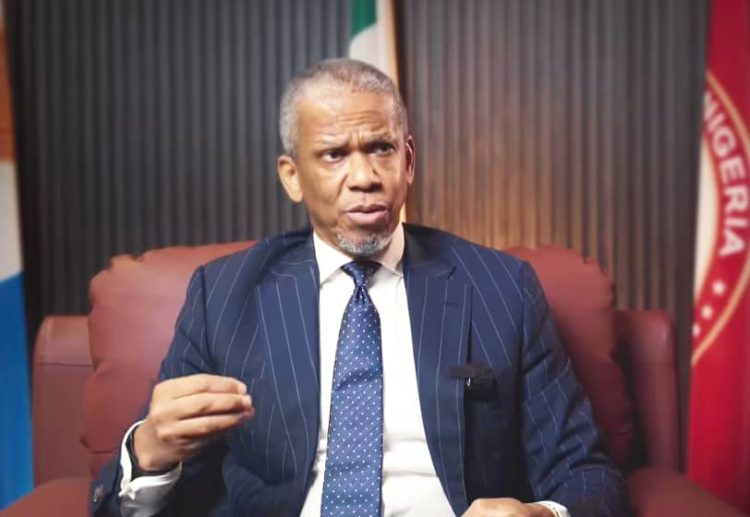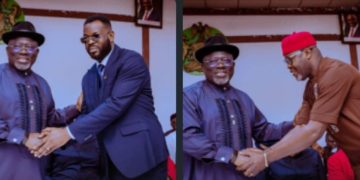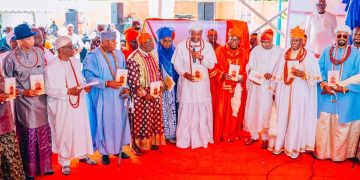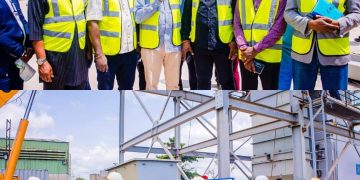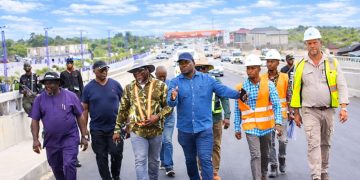In a revealing interview on Meet the Lawmaker”, Senator Ede Dafinone spoke candidly on Nigeria’s economic recovery, youth empowerment, leadership values, and his vision for a better nation.
He defended President Tinubu’s economic reforms, describing them as “hard but necessary decisions” to restore fiscal stability, noting that subsidy removals and currency realignment were already showing early signs of recovery.
On leadership, Dafinone emphasised humility and service over power, warning that politics must return to people-centred governance. He called for stronger protection of Nigeria’s traditional institutions, describing them as vital pillars of culture and stability.
Addressing youth challenges, he urged a shift from dependency on white-collar jobs to skill acquisition, agriculture, and digital innovation, stressing that “hard work and legitimate enterprise must once again pay.”
On Nigeria’s future, he envisioned a nation where wealthy citizens invest locally, declaring, “If every rich Nigerian reinvested at home, we’d spark an economic boom beyond imagination.
Excerpts:
Question: Senator, let’s start with a question you’ve been asked countless times: your family holds a unique place in the Guinness World Records for the largest number of chartered accountants qualified with the English Institute of Chartered Accountants. Considering your diverse career—from finance to leading the Nigerian Conservative Foundation—what is an unconventional lesson you’ve learned from any of these roles that you now find useful in the Senate?
Answer: The Guinness World Record for the most chartered accountants in a family is certainly significant. However, a bigger, unrecorded achievement is that six of us accountants actually worked in the same office for two years without any rancour or fighting. Nobody was murdered, nobody was killed. I say this is a bigger record because siblings who work together, even just two, often fight over money, success, or failure. To go through two years amicably, separated only because of health or marriage, suggests a rare temperament. We listened to one another and were able to communicate effectively. I attribute this stable anchor to our mother, who, though not an accountant, ensured the family cohesion.
Question: You are an accountant by profession, a field that demands precision. Now, you are in national politics, a field often characterised by ambiguity. How easy was it for you to switch between these different hats?
Answer: It’s often compared to the difference between a science student and an art student—most people struggle to manage both with the same ease. But what I like to tell people is that I went to school. If you are roundly educated, especially in the school of life, you should be able to cope in every scenario. I’ve been involved in politics since 1998, contesting primaries in 2006. Over the last 26 years, I’ve experienced hard and expensive lessons—I’ve been tricked, deceived, played, and scammed. All these lessons prepared me for where I am today. So, yes, I am an accountant, but I think I can finally claim now that I am also a politician.
Question: You have been recognised as the Ede of Okpe Kingdom; a title rooted in service to your people. What lessons from your leadership role as a community chief do you carry into the national issues you address in the Senate?
Answer: If I hadn’t occupied those roles with my people, I would have a less exposed understanding of their needs, their thinking, and what drives them. I’m a Trustee of the Okpe Leaders of Thought, the Okpe Union, and Chairman of the Sapele-Okpe Community Land Trust Association, among others. These positions exposed me to all sorts of situations that I think make me a better person and a better senator today. My people also know me through my work, not just by my late father’s name. For instance, when I first contested an election in 2013, I simply wasn’t ready. By 2023, my CV had multiplied tenfold in capacity and outreach. I am much more prepared for the assignment now than I ever was.
Question: Returning to the Senate, what immediate fiscal policy adjustments do you believe Nigeria needs to ease the current economic hardship, which impacts everyone from the grassroots up?
Answer: The challenge is not just about the people, but the economy itself. We’ve endured a long period of financial pressure, which falls hardest on those least able to cope—families struggling for food, rent, and school fees. Let me assure you, we in the Senate are feeling this pressure directly; our constituents have direct lines to us for help with hospital bills and feeding their families. The message that Nigerians are not having it easy is constantly heard here.
The hardship stems from the necessary, hard decisions taken by President Bola Ahmed Tinubu, who is arguably the most prepared president Nigeria has ever had. He came into office ready and knew precisely what was needed to put the nation back on a sustainable path. He implemented three pivotal policy changes: Removal of the Petrol Subsidy: This scheme was enormously costly and largely benefited a handful of people. Removal of the Power Subsidy: This was critical because unsustainably low tariffs were imploding electricity companies, and Removal of the Foreign Exchange Subsidy: This allows the currency to reflect its true value based on our production.
These steps are starting to yield results. Economic indicators show a turnaround, and I anticipate that by Christmas, Nigerians will acknowledge that the economy is improving. Market prices have begun to fall from their previous highs. Furthermore, the government is adjusting policies to boost local agricultural production and is directing borrowed funds to projects that directly serve the masses.
A major long-term fix is the Compressed Natural Gas (CNG) policy. This redirects previously wasted gas to fuel vehicles at potentially one-third of the previous cost, which will significantly slash the cost of transportation for goods and people in the coming years. While the present is difficult, these decisions are positioning us for a much better future. I believe that by 2027, the economic pushback we see now will be gone.
Question: How can the government manage to cushion the effect for people between the time hard policies are enforced and the time the turnaround becomes visible?
Answer: The government has tried to ease the burden through initiatives like the Conditional Cash Transfer and the distribution of grain and rice. While there are always implementation problems, the effort to put resources into the pipeline for those who need it most is there. In the background, we must also remember that a global recession has been on for a while. The pain we see in Nigeria is not isolated; many countries are struggling. My advice to every Nigerian is this: if everybody on your street is hungry, you don’t have to be hungry as well. There will always be a one or two percent doing well; you need to do whatever you can legitimately to shift yourself from the 99 percent and move into the one percent that are doing well.
Question: Beyond empowerment programs, what fundamental shift do we need to make young people see a future and the possibility of thriving in Nigeria, encouraging them to stay rather than emigrate (Japa)?
Answer: There are many layers to this. The first is role models. We don’t have enough local role models showing that hard work and doing the right thing legitimately pays. We need to reward those who work hard and sacrifice, rather than seeing those who cut corners benefit. Secondly, we must accept that not everybody will get a job at the end of university. The future, globally, is about people appreciating their own personal skills, finding that skill, and using it to create a life for themselves. This is where skill acquisition and training come in.
Thirdly, agriculture is key. We are identifying crops that can be grown on just two or three acres of land to yield a substantial monthly income. This also applies to fish farming, where we have been training young people. Monitoring those who are successful is a powerful way to encourage others.
Finally, the world is changing rapidly. The physical borders we protect today will become irrelevant in the next 20 or 30 years. Education must shift. When I went to school, our job was to memorise and “vomit it out” in the exam hall. Now, you can ask your phone, “How do I make a television?” and the answer is instantly available. The significant change is that young people need to be trained on what questions to ask. You don’t need to retain all the information; you must know what to ask and where to find the information.
Question: You’ve been a strong advocate for the creation of the Ethiope State. Beyond the excitement of having a new state, what exactly do you believe this would achieve for the Urhobo people?
Answer: I see this issue in two parts — the practical and the political. From a practical standpoint, history shows that new states in Nigeria have always been created under military regimes, not civilian governments. So, realistically, the likelihood of creating new states now is quite low. However, there’s also a valid argument that if any new state is to be created, every region should make its case — otherwise, you risk being left out when decisions are made.
The broader point, however, is that people demand new states because they want government closer to them. That’s understandable, especially where governance hasn’t worked effectively. If an Urhobo or Ethiope State were created, it would bring administration and resources nearer to the people. But even within such a state, internal divisions might still arise — different Urhobo communities could femarginalisedzed.
So, while I understand and support the sentiment — particularly because it would give the Urhobo more representation and control over their resources — we must also be realistic. The true solution lies not just in drawing new boundaries, but in ensuring that government at every level allocates resources fairly and efficiently. Otherwise, we’ll simply keep breaking up the same problems into smaller units.
Question: Regarding constitutional review, there are constant calls for a complete overhaul. What specific constitutional amendment do you believe is most critical to address the core challenges we’re facing?
Answer: I believe that rather than discarding the existing constitution, we should focus on improving it. Starting afresh would only create confusion and instability. The sensible path forward is to amend what we have — but that, of course, demands broad cooperation at both the national and state levels. Constitutional change is never easy; it requires everyone to pull in one direction.
If you ask me what change I consider most significant, I would say the protection of our royal fathers. This is something my late father also strongly advocated. Many of our monarchies — some over 800 or 900 years old — have custodians who have sat on the throne for decades, preserving the traditions and values of their people. Yet, under our current laws, a newly elected governor, perhaps 40 years old, can wake up one morning and remove an 85-year-old monarch who has been on the throne for 60 years simply because he disagrees with him.
That, to me, is deeply wrong. These traditional rulers embody our heritage and identity; they should be protected, not humiliated by political interference. In other countries, historical buildings are preserved by law — no one can alter them without approval. But here, our monarchies, which are far older and more meaningful, face constant threats from transient political powers. We must enshrine in our constitution stronger protection for these institutions. They are living symbols of our history and culture, and allowing them to be undermined by politics is, frankly, bastardisation of our heritage.
Question: If you were not an accountant, and not a Senator, what other career path would you have chosen?
Answer: I am the politician in my family, but out of all my siblings, I am the shiest and the most private. I don’t like unnecessary formality. I struggle with staff who insist on carrying my bag because I don’t think it is necessary—the bag isn’t heavy. The trappings of government and the government’s not yours, and you must understand that difference.
If I had to choose, I would be very happy on a beach somewhere selling ice cream and drinking a piña colada. I work for my children and believe in helping others. The importance of money is that it must reach a level of comfort, not necessarily massive wealth. More money will not bring you more happiness than the simple things in life or the happiness gained from helping others.
Question: If you had a magic wand and could change one thing in Nigeria right now, what would it be?
Answer: If every wealthy Nigerian were to invest his wealth within the shores of the country, that would create an economic boom of unimaginable proportions. We have so much money stashed away illegally—in Nigeria and outside—and if all that money could be invested in factories, schools, and healthcare, we would be a much happier and better-off people.
Nigerians are the most industrious Africans by miles. You can drop a Nigerian anywhere, and a year later, they’ll be running things. Our potential, in terms of what our people can achieve, is many times greater than thatatate value of our oil resources.
Question: And do we need a magic wand for that?
Answer: A small magic wand. My theory is that the government could announce a one-time amnesty. Every Nigerian who amassed wealth illegally could make it clean by disclosing the money. They would not be prosecuted or jailed. The only punishment would be that they could not hold any government position or be a director in any company. But that money, having been brought back, must be invested in the country. This would save many people pain, and it would spur development, short-cutting the process that all economies go through of turning illegal wealth into productive capital.
Question: Final Assurances?
Answer: I want to assure Nigerians that things will get better. It has taken time, and a lot of people have gone through pain, but the government is hearing, is seeing, and is doing something about it to make things better. It’s not long to go. They should just hold on and know that it will get better generally everywhere.


